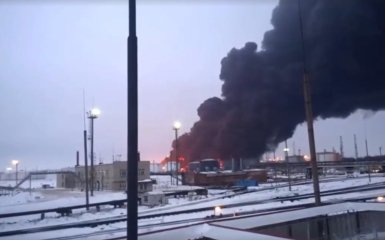As Bloomberg journalists note, numerous attacks by Ukrainian UAVs on Russian oil refineries mark a new stage in the criminal war unleashed by Russia.
What do the numerous drone attacks on the Russian territory mean?
Journalists of the publication note that Ukrainian drones are currently attacking a strip of Russian refineries built in Soviet times with a length of more than 2,000 km.
The publication emphasises that since the beginning of the year, Ukrainian UAVs have successfully attacked at least nine similar objects.
According to some estimates, 11% of Russia's total capacity has been disabled.
Since the conflict on the front line has shifted in favor of Moscow, the use of drones is becoming a key element of Ukraine's defense, the publication says.
It is noted that Kyiv was able to strike deep into Russian territory at objects crucial to the development of the front-line situation.
Russia is a gas station with an army, and we intend to destroy this gas station. "We're going to focus on where it will have the biggest impact, which is financial resources," said Francisco Serra-Martins, co-founder and chief executive officer of drone maker Terminal Autonomy.
A month and a half ago, Ukraine created the Unmanned Systems Forces — a specialized unit specializing in drones. Until now, the Armed Forces of Ukraine have already used this technology with great success, destroying several vessels of the Russian Black Sea Fleet.
And today, what began as a largely symbolic attempt has turned into a concerted campaign to harm a strategic goal, the publication says.
In a comment to the publication's journalists, drone manufacturers noted that the success of Ukraine's current actions did not come quickly.
Meanwhile, massive attacks by Ukrainian drones on Russian oil refineries have already provoked an increase in the prices of gasoline and diesel fuel on the St. Petersburg International Commodity Exchange.
Although the fuel price at gas stations in Russia has remained almost unchanged, the Russian authorities may have to direct more crude oil for export due to the impact on the pace of its processing.
What is the purpose of Ukrainian drone attacks on Russian refineries?
Currently, Ukraine's drone campaign is focused solely on exerting economic influence inside Russia, limiting the country's ability to convert crude oil into fuel and weakening its air defences.
In essence, this is a new form of war of attrition, when these systems are deployed in huge numbers against strategic objects, — notes Serra-Martins.
According to another drone manufacturer, attacks on Russian refineries also have a psychological purpose.
He noted that Kremlin propaganda is trying to make its citizens forget that the country is at war, but long lines at gas stations will bring the reality of the conflict into their daily lives.
At the same time, the publication's material indicates that the Russian Federation's authorities have made a series of concerted efforts to minimise any impact on broad sections of the population.
In particular, in several regions, residents were prohibited from filming the consequences of Ukrainian drone attacks on oil industry facilities.
In the Leningrad region, such videos and pictures were even banned, although the punishment for violating the order has not yet been determined.
This is taken very seriously. The population wants to know when Russia is going to retaliate, — emphasises the head of the Moscow Center for Political Information Aleksei Mukhin, which provides consulting services to the administration of the President of the Russian Federation.
At the same time, it is reminded that drones are becoming an increasingly important element of Ukraine's military strategy, but they cannot replace modern NATO weapons.
Kyiv has to rely on these drones because its allies do not want to provide long-range missiles capable of destroying targets deep in Russia for fear of escalation. On top of everything, due to the multi-month delay in the US military aid in the amount of $60 billion in the Congress, Ukraine is increasingly short of even basic ammunition, such as artillery shells, the publication says.




